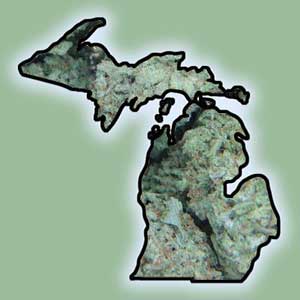 Applications changed without any fanfare, explanation; new forms available online
Applications changed without any fanfare, explanation; new forms available online
Flint– New applications are now in effect for Michigan’s Medical Marihuana Program (MMP), including a complete overhaul of new and renewal patient applications, caregiver attestations and other forms.
This change came to light during a call-in segment of the Planet Green Trees Radio Show, broadcast Thursday evenings from 8 – 10 PM EST on blogtalkradio.com. On-air personalities commented on the form and the changes, including Michigan- Americans for Safe Access Vice Chairperson Jamie Lowell, Michigan ASA Public Relations Director and Compassion Chronicles Editor Rick Thompson, Birmingham Compassion leader Chad Carr and attorneys David Rudoi and Michael Komorn. Follow this link to find previous episodes of the Internet radio show.
SOME CHANGES MANDATED BY LAW
Some of the new form fields are a product of an overreaching and manipulative administration at The Department of Licensing And Regulatory Affairs (LARA). Other changes in the forms are consistent with the requirements contained in the Walsh Bills, a package of four bills whose aim was the first alteration of the 4-year-old Michigan Medical Marihuana Act (MMA) and the public health code.
The Walsh Bills, named for House Representative John Walsh, began life as a group of eight bills introduced with much fanfare by marijuana rights opponents in 2011. After a year and a half of citizen activism and intense media criticism the group of bills were whittled down to four, their content watered-down and made more tolerable. The Walsh Bills were passed during the reprehensible lame-duck session on the Michigan legislature’s last day in office for the 2012 session. That single day saw the passage of hundreds of bills; most of the Walsh package had been voted down early in the day but late-night legislative bartering saw the minority Democrats falter and acquiesce to Republican demands.
“The original set of (Walsh) bills were designed to effectively shut down the Michigan Medical Marihuana Program and to virtually eliminate the protections and defenses intended by the passage of the Act,” stated Lowell. “Fortunately, most of the devastating language was changed or removed. However, there remains little that works for the direct benefit of patients and caregivers.”
Most of the changes mandated by the Walsh Bills officially take effect on April 1, 2013. One of the four bills, House Bill 4856, amended the Public Health Code and was made effective earlier in 2013. That bill made changes to the way marijuana is transported in automobiles.
LARA, the Michigan governmental agency responsible for administering the MMP, maintains the official website for the Program and has made the new forms available for download. Some forms carry a bold statement saying ‘Proof of Michigan Residency is Required’, a change needed to maintain compliance with rule changes contained in HB 4834. The two forms of acceptable residency verification are a valid Michigan driver’s license/State ID card or a valid Michigan voter registration card.
The application combines the the new patient application, the renewal application and the change of caregiver in the new Application Form For Registry Identification Card’s first page. The second page includes a tax form-style checklist for proper documentation and how to qualify for the discounted application fee for those enrolled in SSI/Full Medicaid/Disability. Also included at the end of page 2 is a section titled “What To Expect After You Submit Your Application”. It includes contact information, rejection information and timetables for approval.
The Caregiver Attestation was changed to a two-page form as well, including a new section mandated by those same legislative changes: a felony exclusion checklist. Violent felons are now forever forbidden from growing cannabis plants on behalf of a patient, as all felony drug convicts already were. All persons convicted of any felony in the last ten years are similarly prohibited from growing marijuana on behalf of a registered patient, as a result of provisions contained in the former House Bill 4851.
Significant changes to the Physician’s Certification form were created by that House Bill, which outlined in greater detail the requirements needed to establish a bona fide doctor-patient relationship. Boxes requiring the physician to verify the patient’s certification included an in-person examination are notable changes. Physicians are required to check off boxes stating they will maintain records, seek follow-up care and have reviewed relevant records before signing the form.
CHANGES NOT MANDATED BY LAW
LARA has included language and requirements that seem to increase the burden of proof for issuing a recommendation for certain conditions.
The Physician’s Certification form divides the list of qualifying conditions into two groups- a list of eight named conditions and a separate list of five seemingly symptom-related conditions of a general nature. In an odd change the form now requires more information about the root cause of symptom-related ailments, like chronic pain and severe nausea. This is a change not mandated by any new laws and reflect a general desire among Governor Snyder’s conservative administration to ‘tighten up’ the recommendation process.
The new details required could be used by prosecutors to disqualify the bona fide doctor-patient relationship during court cases, a disturbing tactic being used by prosecutors to eliminate a patient’s right to have their legitimate medical need for cannabis from being considered by a judge or jury. A verification check-box contained on the second page of the Certification form makes it clear that the new information is required, not optional.
Also altered was the signature portion of the new Certification form. Previously doctors had signed their name below a statement containing a line that read: “I have the responsibility for the care and treatment for the above-named patient.” In the current version of the Form, that line has been removed, possibly in response to court cases illustrating that a certifying physician is not required to provide ongoing medical treatment for the underlying condition.
Adding new conditions to the list of ailments qualifying a person to use medical marijuana has been empowered by the Walsh Bills, which holds LARA accountable to conduct the hearings ignored by them and the agency formerly in charge of administering the MMA, the Michigan Department of Community Health. The hearings required in 2008-s MMA had been denied for four years; a lawsuit from Cannabis Counsel of Detroit and the hard work of activists like John Evans forced the Medical Marihuana Review Panel to meet for the first time in late 2012. In advance of new conditions like Parkinson’s Disease and Post-Traumatic Stress Disorder being added to the ailments listing, a spot to write-in any new qualifying conditions was inserted in the Physician’s Certification form.
LARA has provided the following statistics regarding patient and caregiver registrations:
Program Statistics as of 2/28/2013:
-
366,324 original and renewal applications received since April 6, 2009.
-
131,861 active registered qualified patients.
-
27,128 active registered primary caregivers.
-
33,747 applications denied — most due to incomplete application or missing documentation.
Resources:
View the final versions of the Walsh Bills by clicking on the links below:
HB 4856
2012-PA-0460 former House Bill 4856
HB 4851
2012-PA-0512 former House Bill 4851
HB 4853
2012-PA-0513 former House Bill 4853
HB 4834
2012-PA-0514 former House Bill 4834
Related stories can be found below:
Three years later, medical marijuana grower has his day in court
Cannabis Politics in Michigan: Coming Of Age
The Walsh Bills, by Tim Beck
Mystery Solved: Attorney Matthew Abel Clarifies The Michigan Medical Marijuana Bills
Source: The Compassion Chronicles







